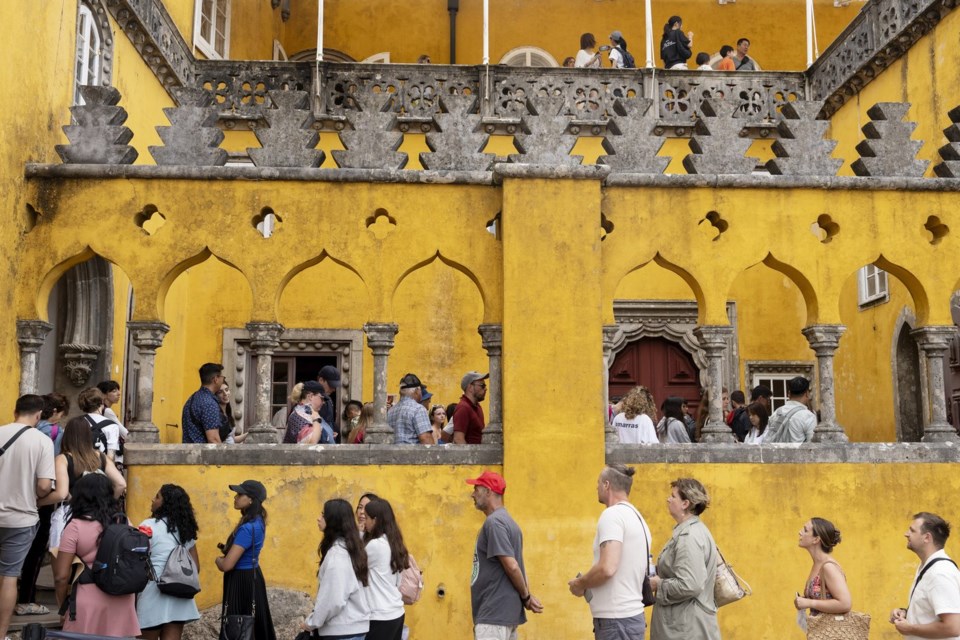Martinho de Almada Pimentel lives in Sintra, Portugal, in a house built by his great-grandfather in 1914. The house is a symbol of privacy, with a hard-to-find doorbell that rings a bell on the roof. However, Pimentel’s privacy has been increasingly invaded by the influx of tourists who visit Sintra’s mountains and castles.
The town, known for its cool microclimate and scenic beauty, attracts more than 3 million visitors annually, leading to severe traffic congestion and disturbances near Pimentel’s home.
The surge in tourism, often referred to as “overtourism,” has significantly impacted Pimentel’s daily life. Tourists frequently pull his doorbell out of curiosity, while the noise and pollution from traffic and large scooters disrupt his peace.
The sheer volume of visitors, sometimes reaching 5,000 per day, exacerbates the situation, leaving Pimentel feeling more isolated and frustrated than he did during the COVID-19 lockdowns. He now avoids going out, angered by how tourism has affected his once tranquil surroundings.

Sintra’s Tourism Boom Disrupts Residents as Overtourism Challenges Intensify
The issue of overtourism is not unique to Sintra; it’s a global phenomenon. The summer of 2024 is expected to break records for global tourism, fueled by a combination of revenge travel, digital nomadism, and visa policies that have contributed to skyrocketing housing prices.
The effects of overtourism are visible worldwide, from traffic jams and overcrowded attractions to the displacement of local residents. Venice, Italy, has even introduced a fee for day tourists to manage the overwhelming number of visitors and protect its fragile sites.
Protests against overtourism have erupted in various cities, including Barcelona, where locals have resorted to shaming and even squirting water at tourists. These demonstrations reflect the frustration of residents who feel that their quality of life is being compromised by the influx of visitors.
The protests serve as a warning to destination leaders: if they don’t manage tourism better, locals might drive tourists away, taking their spending power elsewhere. The core issues include housing affordability, traffic congestion, and water management, which are exacerbated by poorly managed tourism.
The term “overtourism” has become a buzzword, but some experts argue that it oversimplifies the problem. The real issue lies in the failure of crowd management and the lack of response from political leaders to the challenges posed by mass tourism.
While tourists themselves are not inherently problematic, the rapid resurgence of tourism post-COVID has caught many destinations unprepared. The need for better research and management strategies is clear, as the current approach is leading to widespread discontent among locals.
In Sintra, the tourism boom has created significant challenges for residents like Pimentel and Virpi Makela, who run a bed-and-breakfast in the area. Makela describes the chaos of Sintra’s traffic, where confusing and constantly changing rules leave visitors frustrated and lost.
The influx of tourists has led to blocked roads and disorganized traffic, further aggravating the situation for both residents and visitors. The frustration of residents has led to the formation of a local association demanding better management of tourism in the town.
In response to these challenges, local governments are taking steps to manage tourism more effectively. In Lisbon, the number of tuk-tuks allowed in the city has been reduced, and more parking spaces have been created to alleviate traffic congestion.
In Sintra, the municipality has invested in additional parking lots outside the town and is developing youth housing at lower prices near the center. Ticket sales to popular historic sites like Pena Palace have been limited to reduce overcrowding.
Despite these efforts, residents feel that more needs to be done. They have organized to push for better communication from local leaders and more stringent measures to manage tourism. They are particularly concerned about the impact of a new hotel being constructed, which is expected to increase the number of overnight visitors.
The residents’ group emphasizes that they are not against tourism itself but against the chaos it brings when poorly managed. Their manifesto calls for putting residents’ needs first to restore balance to their community.
